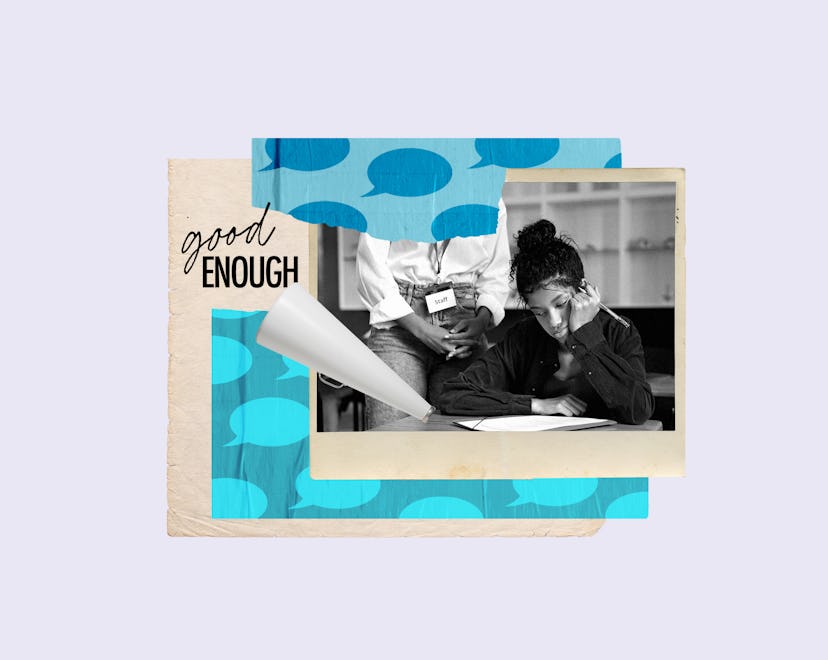Parenting

Help! I’m Worried My Kid Has The Bad Teacher.
There are truly bad teachers in the world, but odds are this is more about fit — and a good lesson in flexibility.
Dear GEP,
I’m sorry to report that this year, my kid was assigned the bad teacher. You know what I mean; there’s one in every great or every school, and all the other parents have reacted to his class assignment like he got a terminal illness or something. Should I be worried?
The first thing I can tell you is that you are not alone, my dear. As with the turning leaves, it is a rite of fall that parents start gossiping about who is in whose class. On text chains and WhatsApp groups, at Back-to-School nights and playdates, even the most conscientious of parents have a hard time not analyzing the implications of the annual class lists.
Are there legitimately “bad” teachers? Of course there are. Teachers are people, and people have all kinds of problems. In my youth, some might have called me a bad teacher — at least in my first year, when I had little to no professional attire or credentials. But let’s put those cases aside to talk about the more common phenomenon, which may be at play here, something I’ll call “bad teacher fit.”
Most of the time, what someone means when they warn you against a “bad” teacher is they either have unreasonable expectations about what a teacher should be or else that teacher was a bad teacher for their particular child. Last year, my son got the “old-school” teacher, someone a parent I knew had wished on my behalf that “we” (hah!) wouldn’t get. I lamented that he’d be missing out on the teacher across the hall, who was young and energetic and read the kids the book about not filling their buckets.
My son, though, is a glutton for order, and he absolutely adored his old-school teacher, explaining that she was “strict — but nice.” He said he got more learning done in her class because she didn’t take any shit (my words). Other kids struggled more — they valued flexibility and didn’t like to be put on the spot, understandably. But many of those kids, too, realized that the “strict but nice” teacher also cared about creativity and silliness, just in her own way.
There are infinite ways to be a great teacher. Think back on your own education, before parents were trained to optimize every moment of their children’s educational experience. I had teachers I loved because they were relentlessly kind, others who were demanding, others who were not very interested in lesson plans, others who came to class meticulously prepared. Just like parents, teachers have a wide range of possible positive traits to share with the children they come into contact with. Whatever your image of a “good” teacher is may not be exactly what your child needs. And more than any one specific kind of adult, they likely need to build relationships with all kinds of adults. This is how they learn how to be flexible and kind themselves.
I lamented that he’d be missing out on the teacher across the hall, who was young and energetic and read the kids the book about not filling their buckets.
That said, if it really is bad, there can be real cause for making a stink. If your child comes from a marginalized group, a truly bad teacher could keep them from accessing learning, or stigmatize their behavior due to their race, or not allow them to express their gender identity. When or if it is time to intervene, there are a couple of ways to approach, depending on the circumstances.
Sometimes teachers are simply new and in need of support. A friend told me a story of her kid’s new teacher becoming so overwhelmed by negative feedback from parents, and from the gossip she intuited was surrounding her, that she shut down communication with families and didn’t allow anyone to come in to volunteer. “Bad teacher” anxiety can snowball, which is why it’s important to check your facts, offer connection over correction, and either encourage your fellow parents to do the same. Yet another friend, after her son complained to her about his after-school teacher, approached the after care director, who explained that the young man had been a graduate of this very same school and yes, had a lot to learn, but that he was coaching him and believed in him. She decided to wait, and lo and behold, the teacher got better. Her son now insisted he was his favorite, and he also learned something about how people are capable of change.
Sometimes the situation does require intervention. Sometimes it’s more than just a bad fit. Another friend’s daughter spent second grade with a teacher who made inappropriate comments, picked on specific kids, and constantly lost her cool. Parents worked together with the principal to request that they observe the teacher, coach her, and try and see if she could fix these glaring problems. Eventually, that teacher was let go. After all, there is also such a thing as bad job fit. Even though the situation did warrant action on parents’ part, no one needed to storm the school with pitchforks. The experience, though painful, built trust and community among the parents and the school, because they were all on the same team, trying to fix the situation together.
How will you know whether it’s time to ask the teacher for a meeting, email the principal, or even consider finding your child in a different situation? As a friend who ended up transferring her child to another school after a tumultuous year with one teacher put it: If your kid is really and truly struggling, “you’ll know.” But don’t get ahead of yourself. For now, try to give it some time and form your own opinion.